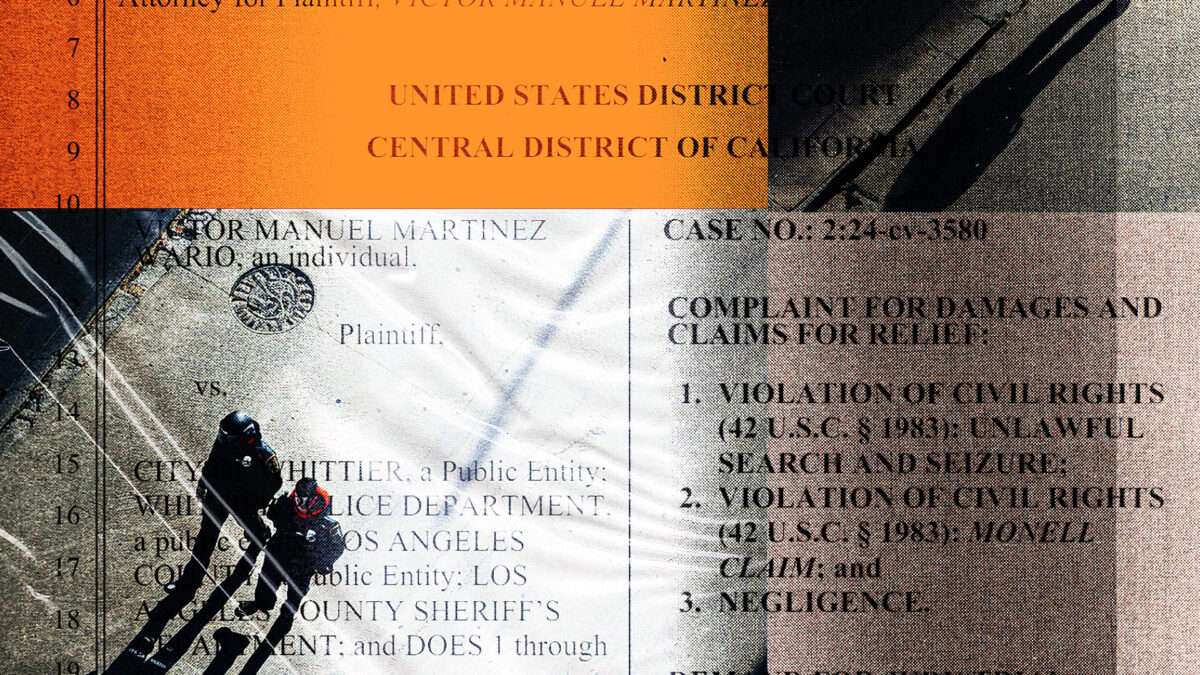A Day Care Worker Who Says She Was Documenting Diaper Rashes Got 126 Years for Taking 8 Photos

A few years ago, Roseberline Turenne, an 18-year-old aide at a Maryland day care center, used her cellphone to take photographs showing "the naked genitals and pubic areas" of eight little girls. Seven of the girls were lying on changing tables, while the eighth was standing in a bathroom. Turenne later claimed she was documenting preexisting diaper rashes, lest she be blamed for allowing them to develop while the girls were in her care.
Turenne was fired after the pictures were discovered because they violated the day care center's policies, which prohibited staff members from photographing children. She also was charged with eight counts each of child sexual abuse, production of child pornography, and possession of child pornography.
Discounting Turenne's explanation of her motive for taking the pictures, a jury convicted her on all 24 counts, resulting in a 126-year prison sentence. Last Friday, the Maryland Supreme Court upheld Turenne's convictions, concluding that the jury reasonably rejected her account, that her conduct met the elements of the three crimes, and that "the evidence was sufficient for the jury to conclude that Ms. Turenne took the photos of the children for the purpose of sexual gratification."
Although Turenne's astonishingly severe sentence was not at issue in this appeal, it vividly illustrates how laws related to child pornography can generate penalties that make little sense. Even if you join the jurors, the intermediate appeals court, and the Maryland Supreme Court in disbelieving her account of why she took the pictures, she did not share them with anyone, and she was not accused of assaulting the girls. Yet under Maryland law, Turenne will have to serve at least a quarter of her 126-year sentence—nearly 32 years—before she is eligible for parole.
People convicted of violent crimes in Maryland have to serve at least half of their sentences before they are eligible for parole. But someone who was convicted of voluntary manslaughter and received the maximum 10-year sentence still would have a shot at parole after five years. Even someone convicted of first-degree rape, which triggers a mandatory 25-year minimum, could end up serving less time than Turenne faces for noncontact offenses that consisted of nothing more than taking pictures.
That reality is especially troubling because it is not clear that Turenne committed the crimes with which she was charged. Just four out of seven justices agreed that all of her convictions were valid. In a partial dissent joined by Justice Brynja Booth, Chief Justice Matthew Fader concluded that there was insufficient evidence to convict Turenne of producing and possessing child pornography. Justice Shirley Watts concurred, and she filed a separate dissent arguing that Turenne's sexual abuse convictions also should be overturned.
As relevant here, Maryland law defines child pornography as a "visual representation" that "depicts a minor engaged as a subject…in sexual conduct," which includes the "lascivious exhibition of the genitals or pubic area of any person." Although the statute does not define "lascivious exhibition," the Maryland Supreme Court settled on a "content-plus-context" test for determining "whether the image is objectively sexual in nature."
The production and possession charges, in other words, did not hinge on Turenne's personal motivation. In concluding that Turenne's pictures were "objectively sexual," the majority noted that "all eight girls were partially or fully nude," that "all had nude genitals and pubic areas on display," that "none of the children's faces are visible in the photographs," that the picture "were all very similar to one another," and that several girls were in "poses that resemble what one might see in some adult pornography: the subject on her back, her legs spread, displaying her genitals."
Fader agreed with the test used by his colleagues but argued that they misapplied it. "I would conclude that none of the eight photographs at issue depicts a 'lascivious exhibition of the genitals,'" he writes. "Seven of the photographs depict a child on a diaper-changing table, naked, in a position that is fully consistent with a child having her diaper changed. The final picture depicts a child in a standing position in a bathroom, naked from sternum to the knees. None of the children are posed in anything resembling a sexual position. There are no other people in any of the photographs, nor are there any objects that are sexual in nature or that change the nature of the images from children getting diaper changes to anything objectively sexual."
Although "the framing of the photographs is a relevant consideration," Fader says, "the
framing here still makes clear that the pictures are of children during the process of a diaper change." And contrary to the majority's claim that the girls' "poses" are reminiscent of adult pornography, he adds, "the children are situated in the midst of diaper changes—a perfectly ordinary, nonsexual event—not posed in sexual positions. That an image of an adult posed in a similar manner might be viewed as an objectively sexual image—perhaps viewed as sexual because the position is unnatural for an adult in the ordinary course of a day, or perhaps just because of anatomical development—is irrelevant, because these are images of infants, not adults."
Fader says other "contextual elements" cited by the majority—including the photos' similarity to each other, the fact that "they were all taken at a daycare center," the fact that "they were all taken in the center's bathroom, where Ms. Turenne was secluded," her initial statement that the photos had "no meaning," and her "implausible documentation-of-diaper rash explanation"—were "relevant to the jury's consideration of Ms. Turenne's likely purpose in taking and keeping the images." They therefore were "proper considerations for the jury in determining whether Ms. Turenne exploited the children for her own benefit in connection with the child sexual abuse charges." But the test that the majority applied in upholding the child pornography convictions is supposed to be "objective," making her motivation irrelevant.
"The only contextual element that is relevant to the jury's understanding of what is depicted in the images themselves, to the extent it is unclear in any of them, is that the children in seven of the eight images were lying on a changing table and the eighth was in a bathroom," Fader writes. "But knowledge of the setting in which the pictures were taken does not add any element of objective sexuality to them, separate and apart from Ms. Turenne's subjective motivation. The other contextual elements identified by the Majority speak to Ms. Turenne's subjective motivation, not what is depicted in the images themselves."
To convict Turenne of the sexual abuse charges, the prosecution had to prove beyond a reasonable doubt that the photos constituted "exploitation of a minor," meaning she "took advantage of or unjustly or improperly used the child for…her own benefit." That "benefit," according to the prosecution, was "sexual gratification." Fader agreed with the majority that "there was sufficient evidence for the jury to infer that Ms. Turenne took the eight pictures at issue for her own benefit."
Watts, however, dissented on that point too. She notes that the prosecution made much of Turenne's sexual orientation, which Watts thinks improperly figured in the verdict.
During Turenne's trial, a prosecutor asked her if she was attracted to women. "I wouldn't say attracted to women," she replied. "I'm bisexual, like, I'm still confused about what I like between men or women. But not children, no."
The prosecution, which noted that all the photographs featured girls and presented testimony from a co-worker who said Turenne had told her "she was gay," argued that her sexual orientation was relevant in assessing why she took the pictures. Prosecutors also noted that Turenne had adult pornography featuring both men and women on her phone—although, contrary to what you might expect given the charges against her, there was no indication that she had "conducted any internet searches for child pornography."
The Maryland Supreme Court explicitly declined to consider that evidence. But Watts argues that it played an important role in the case. Turenne "was prejudiced by the admission of the evidence," Watts says. And "with these circumstances omitted, the remaining evidence is insufficient to support Ms. Turenne's convictions for child sexual abuse."
Watts suggests that Turenne's explanation of her behavior is more plausible than her colleagues think. "Some of the photos show redness or darkened areas—i.e., consistent with diaper rashes—near the genital area and/or in the fold of the buttocks, and one of them shows diaper cream in and around the fold of the buttocks," she writes. "Ms. Turenne testified that she took the photos to prove that children had diaper rashes before she started watching them. Although the jury evidently did not find this part of Ms. Turenne's testimony credible, the nature of the photos and the circumstances surrounding them being taken do not alone establish that the photos were taken for the purpose of sexual gratification."
The majority emphasized that Turenne initially denied taking the pictures, later said they had "no meaning," and did not offer the diaper-rash explanation until her trial. But Watts thinks Turenne's evasiveness and reticence are understandable in the circumstances, even without accepting the prosecution's theory of why she took the photos.
"Although the photos were taken clandestinely in violation of the daycare center's no-photo policy and Ms. Turenne initially denied having taken them, these facts were not sufficient for a rational juror to infer that the photos were taken for sexual gratification," Watts writes. "A rational juror could have inferred that Ms. Turenne took the photos because she was concerned about being blamed for diaper rashes and lied about having taken them because she knew doing so was against the daycare center's policy. A rational juror also could have inferred that Ms. Turenne took the photos while she was alone with the children because she knew that taking the photos was against the center's policy….Without consideration of evidence admitted at trial concerning Ms. Turenne's sexual orientation and possession of adult pornography, no rational juror could have found beyond a reasonable doubt based on the appearance of the photos that they were taken for sexual gratification."
Although Turenne did not challenge her sentence in this appeal, Watts notes that "the circuit court imposed an aggregate sentence of 280 years of imprisonment, with all but 126 years suspended, followed by 5 years of probation and lifetime registration as a sex offender." While "criminal offenses against children are heinous and must be dealt with appropriately," she says, "it is disproportionate and draconian to impose an aggregate sentence of nearly 3 centuries of imprisonment, with all but 126 years suspended, under the circumstances of this case." Whatever you make of Turenne's defense, that much seems clearly true.
The post A Day Care Worker Who Says She Was Documenting Diaper Rashes Got 126 Years for Taking 8 Photos appeared first on Reason.com.





